|
|
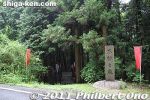
Near the south of JR Mikumo Station (Kusatsu Line) is Fudo-no-taki Waterfall. One of two noted waterfalls in Konan. The waterfall's trail entrance is right along the road, marked by a stone monument. MAP
|
|
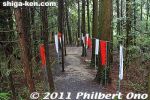
From the road, the path to the waterfall is very short, lined with banners written with the names of ascetic pilgrims who came to pray or practice at the waterfall.
|
|
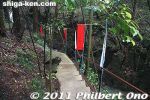
Path going to the waterfall.
|
|
|
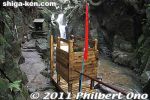
There's even a small lookout deck.
|
|
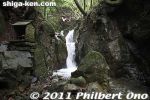
On the left of the waterfall is a small altar for Fudo-Myo-o, the patron god of mountain ascetic priests. The waterfall takes its name after this god.
|
|
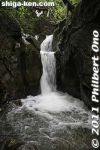
Fudo-no-taki Waterfall in Mikumo, Konan, Shiga Prefecture.
|
|

The waterfall is about 5 meters high.
|
|
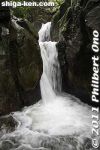
Fudo-no-taki Waterfall in Mikumo, Konan, Shiga Prefecture.
|
|
|
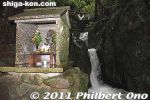
Altar for Fudo-Myo-o.
|
|
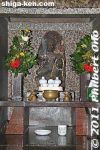
Altar for Fudo-Myo-o.
|
|
|
|
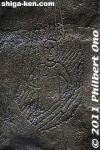
Etching on stone.
|
|
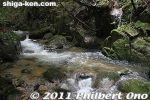
Upstream at the top of the waterfall.
|
|
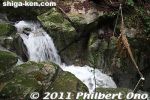
Top of the waterfall.
|
|
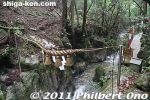
Top of the waterfall.
|
|
|
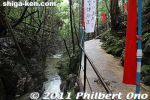
Looking downstream from the waterfall.
|
|

My video of Fudo-no-taki Waterfall in Mikumo, Konan, Shiga Prefecture.
|
|

Konki Senshoku noren curtain. They've been in business in Konan for 200 years. One of three shops left in Shiga doing traditional indigo dyeing with natural (not synthetic) indigo dye. MAPTake a bus or taxi from Kosei or Mikumo Stations on the Kusatsu Line. Get off at Shimoda and walk 50 meters. Parking also available. Phone: 0748-75-0128, Address: Shimoda 1530, Konan-shi, Shiga
|
|

They grow their own indigo plants, dry the leaves in the sun, and extract the dye. They offer indigo dyeing lessons during which you can dye a cotton handkerchief for 1200 yen (T-shirts also). The kind lady first showed us samples of indigo fabrics.
|
|
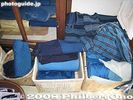
Indigo fabrics for sale. Around 2000 yen per meter. Indigo dyeing came to Shiga from Kyoto. Indigo dyeing is called "aizome" in Japanese. 藍染
|
|
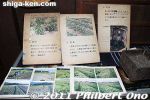
Pictures of their indigo plant farm in Konan.
|
|
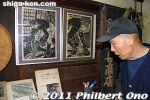
A student created a woodblock print of the indigo artisan dyeing threads.
|
|
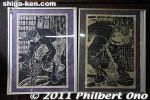
Nice woodblock prints of the indigo master dyeing thread.
|
|
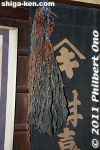
Dried indigo plant.
|
|
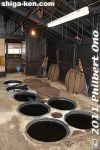
Indigo vats.
|
|

So here's the handkerchief (1200 yen). It's very thin cotton. 近江正藍染 <県知事指定・滋賀県伝統的工芸>
|
|

We fold up the handkerchief in whichever way, then tie strings/rubber bands around it. It is tie-dyeing.
|
|

Then we go to the indigo vats. They are heated with charcoal made with wood from trees on their hill. Each vat has a different indigo density.
|
|
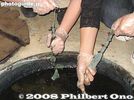
We started with a vat having a low density of indigo. We dip the handkerchief for 15 sec., wring it, then expose it to the air. The indigo dye is actually a murky brownish-yellow color, but turns blue when exposed to the air.
|
|
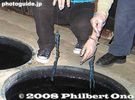
We dipped the handkerchief in multiple vats, each successive vat had a higher density of indigo. The more vats we dip the fabric in, the darker the color.
|
|
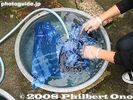
After the indigo dip, water washed the handkerchief.
|
|
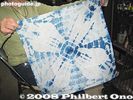
One result... All the designs are unique. We held the wet handkerchief in front of a kerosene heater and it dried quickly.
|
|
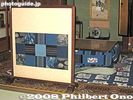
A room inside the shop had indigo fabrics everywhere. It takes years to learn the craft of indigo dyeing, including growing the plants. Like many other traditional crafts, this shop is uncertain who will take over and continue traditional indigo dyeing.
|
|

Indigo placemats on stairs. It's possible for the shop to handle up to 20 people to try indigo dyeing in their shop. Call 0748-75-0128. Address: Shimoda 1530, Konan-shi, Shiga
|
|
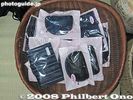
Pouches, etc., made of indigo fabric, for sale. Coming to this place really made me aware of how beautiful the indigo color is. Take a bus or taxi from Kosei or Mikumo Stations on the Kusatsu Line. Get off at Shimoda and walk 50 meters. Parking also avail
|
|

If you go to Konki Senshoku, you might as well also see Shimoda-yaki 下田焼 pottery down the road in the Konan Traditional Crafts Hall (Dento Kogei Kaikan). 湖南市伝統工芸会館 MAP
|
|

Shimoda-yaki is characterized by deep-blue colors on white. They exhibit and sell Shimoda-yaki pottery and also offer pottery lessons. You should make reservations at 0748-72-7444. Take a bus from Mikumo Station and get off at Higashi Iwane 東岩根.
|
|
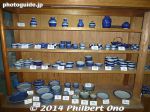
Shimoda-yaki pieces are designed for practical, everyday use.
|
|

Shimoda-yaki started in the 18th century using soil in the Shimoda area of Konan and techniques from Kyoto. Today, only one man makes it, and he has no successor. Pottery lessons cost 3500 yen if you want to make the piece yourself.
|
|
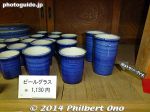
Shimoda-yaki cups
|
|

The hall has a few exhibition rooms.
|
|
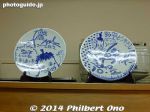
For 700 yen, you can also just paint something on a ready-made plate and have it fired. It takes a few weeks for it to be fired and delivered to you. Closed Mon. and Tue.
|
|
|

Next door to the Shimoda-yaki hall is this hall for trying traditional crafts. たくみの家
|
|
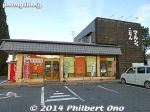
Konan Marché was like a michi-no-eki roadside station. It was a local shop selling local produce, crafts, and souvenirs. It has closed after the new Kocopia shop opened.
|
|
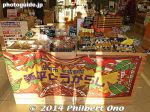
Inside Konan Marché (now closed). Products made of yahei-togarashi hot chili peppers grown in Konan.
|
|
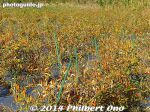
Yahei-togarashi hot chili peppers grown in Konan.
|
|
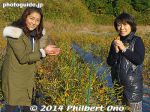
Yahei-togarashi hot chili peppers are grown in Konan by company called fm craic.
|
|

My video introducing Konan also shows yahei-togarashi hot chili peppers.
|
|
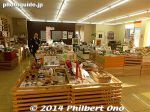
Inside Konan Marché (now closed). A variety of local produce and gifts.
|
|
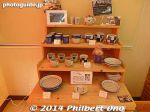
Shimoda-yaki sold by the old Konan Marché (now closed).
|
|
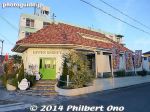
Upper Secret, a popular American-style local cafe specializing in Indian curry with Konan's yahei hot chili peppers and confections. Open 9 am-5:30 pm, closed Tue., Phone: 0748-60-5077Near JR Kosei Station.
|
|
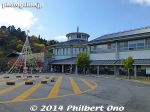
Junibo Onsen Yurara hot spring facility
|
|
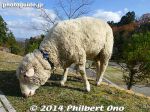
Junibo Onsen Yurara's mascot.
|
|

Nigori-ike Koen Park, local park with a pond noted for cherry blossoms. MAP
|
|

This was 1 or 2 days before the cherries reached full bloom.
|
|
|
|
|
|
|
|
|
|

Painted bench
|
|

Konan has some industrial parks.
|
|
|

Rice warehouse in Konan, Shiga.
|
|
|

JR Mikumo Station on the Kusatsu Line.
|
|

JR Mikumo Station platform
|
|

Manhole in Konan, Shiga.
|
|
|
|
|
|
|